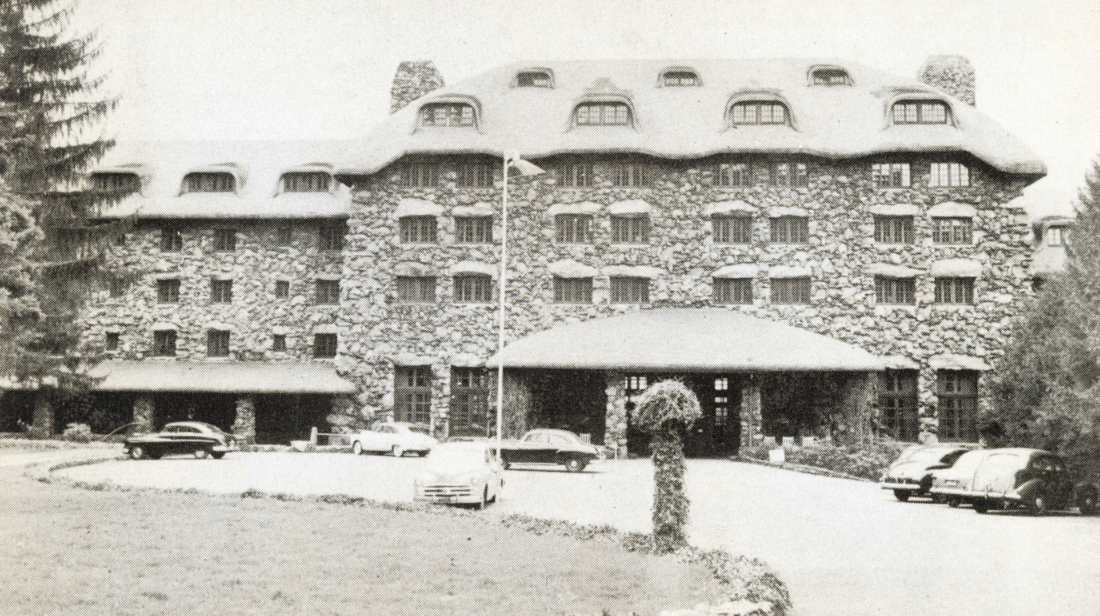In the early spring of 1942 — shortly after the United States entered World War II — the State Department leased the Grove Park Inn to use its facilities as an internment camp for Axis diplomats as well as their family members and servants.
“The state department said the date of the arrival of the internees would not be announced,” The Asheville Citizen reported on March 30, 1942. “While staying at Grove Park inn, the interned aliens will be completely cut off from the outside world.”
The group quietly arrived on April 3 with little reaction from local community members. “Indeed, the arrangements made by the State Department were so efficient and so nearly secret that the transfer of the internees was effected almost unbeknownst to the general public,” The Asheville Citizen reported in the following day’s paper.
“All of this is strictly in accordance with international law,” the article continued. “While the Italians, Bulgarians and Rumanians are here they will be isolated from the community and protected from the curious. Hence their presence is an entirely negative quantity — neither beneficial nor detrimental — in our normal affairs.”
The article further noted:
“Many American diplomats abroad have been interned under the same circumstances. Diplomatic courtesy of a sort transcends the hostile intercourse of nations when they are at war with one another. By according enemy diplomats the same treatment we would wish our own representatives to be given in enemy countries we make certain that no reprisals will be visited in violation of international usage. Until peace comes or an exchange is made possible each group serves the subtle function of hostage for the other.”
By design, local papers did not feature additional reporting on the group’s monthlong imprisonment. “The Citizen and The Times have agreed not to publish anything whatsoever concerning these aliens so long as they are in Asheville,” The Sunday Citizen explained in an April 19, 1942, article. “This agreement was made at the request of the state department in Washington.”
Subsequent information arrived only after the group’s departure on May 6. In the following day’s paper, The Asheville Citizen reported that the 221 prisoners (the first official number provided to residents) departed for their homelands in exchange for U.S. diplomats held abroad.
According to the article, the foreign diplomats had paid for their stay at the Grove Park Inn. Meanwhile, 28 State Department officials and 48 guards were housed at the resort, as well. “Shuffleboard, lawn bowling, badminton, and bridge were reported to have been the chief amusement” during the group’s confinement, the paper reported.
At least 400 additional people — including women and children — were interned at the Grove Park Inn between May and October 1942. As with the first arrivals, local newspapers did not report on these prisoners until after their departures. Even then, few details emerged beyond the size of each group and their nationalities.
However, a June 11, 1942, article does offer a glimpse into the dynamic between prisoners and guards. “Ninety-four Japanese and 20 Germans, interned at Grove Park inn for several weeks, left by special train yesterday afternoon,” The Asheville Citizen reported.
The article continues:
“Neither Germans nor the Japanese appeared greatly interested in their leave-taking. Two middle-aged Japanese men, however, waved vigorously from one of the Pullmans as the train pulled out. The group of spectators and law enforcement officers, numbering possibly 20, stood grim-faced and none returned the parting gesture.”
Editor’s note: Peculiarities of spelling and punctuation are preserved from the original documents.






Thanks for an interesting article. I remember reading about this, but had never heard many details about it. I never heard where German, Austro-Hungarian and Turkish diplomats were held during the Great War, or if they were allowed to stay in their own embassies – US involvement in that conflict was only about 18 months. I believe most of those held at Hot Springs were merchant sailors and immigrants who had not yet gotten citizenship.
Perhaps “held hostage” was not the best choice of words for your title, despite the mention of the word in the referenced Asheville Citizen article. These diplomats were not hostages – they were enemy aliens, and were interned, detained, sequestered, but not “held hostage”.
Many of our diplomatic personnel in the Axis nations and countries conquered by them were recalled after September 1939, but those who were detained generally received decent treatment, even those held by the Japanese. Business people, missionaries, government service civilians and POWs often didn’t fare so well, especially at the hands of the Japanese.